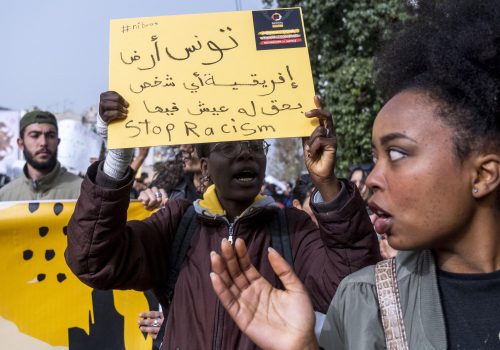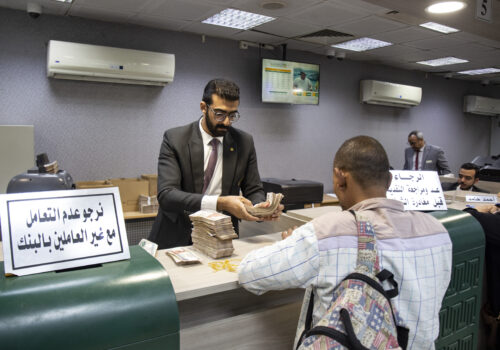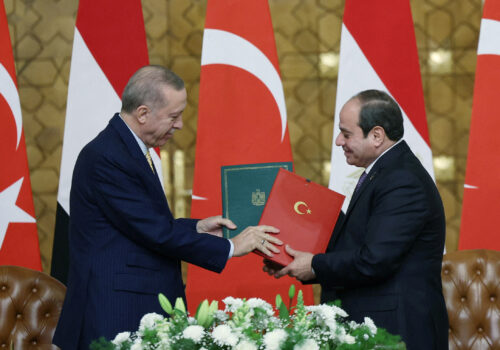A diplomatic solution in Sudan demands greater US engagement with its Arab allies
The civil war in Sudan, which started in April 2023 between Abdel Fattah al-Burhan, commander in chief of the Sudanese Armed Forces (SAF), and Mohamed Hamdan Dagalo (better known as “Hemedti”), commander of the Rapid Support Forces (RSF), is approaching its one-year mark. With more than thirteen thousand Sudanese lives lost and 10.7 million people displaced, the situation continues to deteriorate without any clear end in sight. Sudan remains mired in a cycle of violence perpetuated by both major parties to the conflict: the RSF, whose violent campaign includes widespread reports of rapes and the ethnic cleansing of the Masalit tribe in Darfur, and the SAF, whose indiscriminate bombing raids have targeted innocent civilians.
Despite various peace initiatives undertaken by the international community—including efforts by the United States, Arab countries, and other African nations—regional and international responses have thus far failed to produce any meaningful resolution. In seeking to resolve the war, the absence of accountability for supporters of Burhan and Hemedti looms large, and foreign powers have a crucial role to play. Peace efforts have been unsuccessful because mediator Arab countries—like the United Arab Emirates (UAE), Egypt, and Saudi Arabia—are not acting in good faith but are supporting opposing sides. Halting external support to the generals is crucial to achieving peace in Sudan and setting it on the path to civilian-led rule.
A fertile ground for foreign meddling
Sudan’s civil war is a battle for legitimacy and power between two ambitious generals, each wielding a distinct advantage but without sufficient power to achieve victory. Currently, al-Burhan positions himself as Sudan’s legitimate ruler and has Cairo’s support. Conversely, Hemedti—with backing from the UAE and control over Sudan’s goldmines—leverages the advantage gained from former President Omar al-Bashir’s coup-proofing policies, which gave the RSF independence from civilian and SAF control. He not only rejects Burhan’s claim, but is determined to emerge as the sole ruler of Sudan.
SIGN UP FOR THIS WEEK IN THE MIDEAST NEWSLETTER
The intricate power dynamics of smaller, independent militias in Sudan add layers of complexity and uncertainty, creating an anti-peace equation that outside forces could easily exploit through proxies.
While Egypt, the UAE, and Saudi Arabia have proven ineffective in stopping Sudan’s war, they play a significant role in its continuation. All three countries have vital interests in Sudan, motivating them to choose sides that will maximize their benefit, even if it undermines Sudan’s.
Egyptian President Fattah el-Sisi sees Burhan as a stable partner to safeguard its regional interests, particularly in the Nile River, which the countries share. While Egypt has participated in mediation efforts and started the Neighbors of Sudan Initiative, it hasn’t been able to leverage its relationship with Burhan to progress toward a peace deal. Instead, it has assisted the SAF’s military efforts by providing drones and warplanes.
In contrast, the UAE supports Hemedti and the RSF by providing military and financial assistance disguised as humanitarian aid. Abu Dhabi serves as a financial haven for Hemedti’s gold business, hosting RSF front companies and bank accounts. Despite being part of peace efforts, the UAE has directed its influence toward assisting Hemedti’s diplomatic efforts rather than fostering negotiations.
Like Egypt, Saudi Arabia views Burhan as a reliable ally to protect its investments in Sudan’s key sectors and its strategic interests in the Red Sea region. However, Riyadh finds it more beneficial to bolster its image as a neutral mediator, potentially giving it an advantage over the UAE in establishing regional dominance and emerging as a credible international partner.
Key US lawmakers have highlighted the UAE’s involvement in supporting the RSF, as seen during the House Foreign Affairs Committee’s Subcommittee for Africa hearing on December 5, 2023. Earlier, members of Congress urged Mohamed bin Zayed (MBZ) to UAE cease support for the RSF via a formal letter. Most importantly, Secretary of State Antony Blinken discussed the need to ensure peace in Sudan with MBZ in January. While Egypt’s support for SAF has also faced criticism, the involvement of Cairo and Riyadh with the warring sides has not received sufficient attention. The external meddling of these countries has run counter to their involvement in peace efforts. This must be stopped to achieve any solution in Sudan.
US response and course correction
Several peace efforts are in place, but progress remains elusive. The RSF and SAF consistently violate agreements, resulting in brief ceasefires and escalating civilian casualties. Even opportunities flaunted as promising—such as the Intergovernmental Authority on Development (IGAD)’s meeting on January 18, before Burhan suspended Sudan’s membership in the East African bloc—have met persistent challenges. There is pressure from the United Nations as well as the United States for a ceasefire, but calls for a Ramadan truce were rejected by Burhan. These efforts, inclusive of US sanctions for human rights abuses and undermining peace and security in the region, have been unable to stop external support, let alone the war.
As the war continues, there is still an opportunity for course correction. US Special Envoy to Sudan Tom Perriello’s recent trip to African countries, the UAE, Saudi Arabia, and Egypt from March 11–23 was a step in this direction. The objectives of this trip highlighted the need to align mediation efforts that are spread across various international platforms, including the IGAD, the African Union, and the respective initiatives led by Arab countries. It also emphasized engaging civilian actors, including resistance committees, trade unions, protest groups, women, and the youth in democratic transition and peace talks. Thus, this trip could be the catalyst needed to advance key priorities in Sudan.
The upcoming Jeddah talks on April 18 could be another opportunity to build on the objectives outlined on Perriello’s trip. The most significant is unifying various peace efforts and making these talks inclusive. This would signal to all parties involved that mediators are willing to collectively pressure the generals, adding seriousness to the peace talks. Additionally, bringing mediating countries together will prevent the creation of competing circles of influence. It will ensure a unified front, rather than fragmented efforts, toward achieving the desired goal.
However, aligning mediation efforts would only be fruitful if the United States were also adamant about aligning mediators’ priorities vis-à-vis Sudan. This begins with prioritizing Sudan in its foreign policy agenda and maintaining a consistent approach. Despite other global priorities like the Israel-Hamas war, and potential time constraints posed by the upcoming US presidential election, the United States must continue building momentum in its engagement in Sudan. One way to do so is to support Perriello and ensure his office is fully staffed. In a recent interview, Perriello acknowledged that “a lot more international engagement is needed” and mentioned “raising the heat on all those who are fueling the conflict.” While commendable, this is a belated recognition of the situation’s gravity, similar to Perriello’s late appointment as special envoy. The key now is for the United States to add weight to its words with constructive actions, which could mean serious backchannel dialogues with its Gulf allies and Egypt to stop their support of the RSF.
As peacekeeping efforts aim for an immediate ceasefire, deploying United Nations peacekeepers in Sudan to ensure the safety of its people and eventually oversee the transition process (akin to the United Nations Integrated Transition Assistance Mission in Sudan) should be considered. This proposed UN mission should be granted access to effectively monitor Sudan’s entry points, including seaports, air routes, and land borders, to curb weapons smuggling and establish humanitarian corridors. To facilitate humanitarian assistance, international efforts should utilize existing networks of local emergency responses. Most importantly, the United States and the international community must provide the much-needed funding to support these efforts. The upcoming humanitarian conference in France could be the chance to hit the nail on its head.
Past efforts have underscored that, unless the underlying issue of mediator support for the generals is addressed, these well-intentioned efforts risk being futile. They will fail to deter ongoing atrocities and leave a power vacuum that attracts actors like Iran and Russia, which also have interests in establishing naval bases on Sudan’s Red Sea coast.
It must be made clear that those providing weapons and funding for Sudan’s civil war are accessories to the humanitarian catastrophe unfolding in the country. If the international framework lets them fall through the cracks with no accountability, its ripple effects will be felt globally in the form of a refugee crisis and an increase in proxy warfare in the region.
Manal Fatima is a program assistant with the Scowcroft Middle East Security Initiative. Follow her on X: @mafasaad.
Further reading
Mon, Mar 6, 2023
Afrocentrism is trending in the Maghreb. It’s because Sub-Saharan migrants are rewriting their narrative.
MENASource By Sarah Zaaimi
North Africa undoubtedly faces a serious migration problem that will continue to aggravate if not addressed regarding its social, cultural, and historical dimensions and root causes.
Sat, Mar 30, 2024
As long as Sisi continues his policies, the Egyptian economy will drown
MENASource By Shahira Amin
While the funding secured in recent weeks will help ease the economic crisis and stabilize Egypt in the short term, skeptics fear it may only offer a temporary respite.
Fri, Mar 15, 2024
Turkey and Egypt bury the hatchet, marking an end to emerging third axis in the Middle East
MENASource By Borzou Daragahi
The carefully choreographed and worded meeting between Erdogan and his Egyptian counterpart, President Abdel-Fattah el-Sisi, served as a final burial ceremony for what was once an emerging third axis in the Middle East.
Image: Saudi Foreign Minister Prince Faisal bin Farhan bin Abdullah Al-Saud stands along with other officials as representatives of the Sudanese army and rival paramilitary Rapid Support Forces sign an agreement for a seven-day ceasefire in Jeddah, Saudi Arabia, May 20, 2023. Saudi Press Agency/Handout via REUTERS


